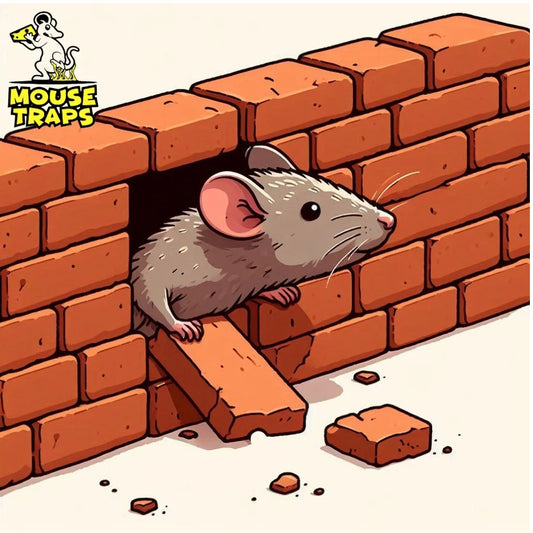Welcome to mousetraps.co.uk! hopefully you're searching for a way to deal with rodents disturbing public restrooms. In this guide we will delve into the ways to handle these pesky rodents effectively equipping you with both the know how and tools (Mouse Traps) needed for a successful approach. In United Kingdom (UK) rodents disturbs the daily life style of residence. They can damage your property and can cause severe health problems. So, without wasting any time let's delve into the details.
Introduction:
In the hustle and bustle of daily life, few things can disrupt our peace of mind as much as encountering unwelcome guests in public restrooms. Among the most notorious intruders are rats, stealthy creatures that can wreak havoc if left unchecked. But fear not, for there exists a silent guardian in the form of mouse traps. Before you start using these devices it's important to have a grasp of the rules that apply to them in the UK. This detailed guide will explore the complexities of mouse trap regulations giving you the information to restore peace in your bathroom.

The Need for Regulation:
Harkening back to the days of yore, rodents have long been a scourge to mankind, spreading disease and destruction in their wake. As civilization advanced, so too did our methods of pest control. However, with progress comes responsibility, and the need for regulations to ensure the safe and humane use of mouse traps became apparent.

Navigating the Legal Landscape:
In the UK, the deployment of mouse traps in public spaces is subject to stringent regulations aimed at safeguarding both humans and animals. The Health and Safety at Work Act 1974, along with various other legislations, lay down the framework for ensuring the proper handling and placement of mouse traps in public restrooms.
Regulations and Compliance:
In the United Kingdom, the use of mouse traps in public restrooms is governed by a set of regulations designed to ensure both effectiveness and safety. These rules detail the kinds of traps allowed, where and how they should be placed and handled and the duties of facility managers, in keeping a space from pests. According to the Health and Safety Executive (HSE), mouse traps used in public areas must meet certain criteria to minimize the risk of injury to humans and non-target animals. This includes the use of snap traps or electronic traps designed to humanely dispatch rodents without posing a threat to other restroom users.

Choosing the Right Trap:
When it comes to selecting the appropriate mouse trap for a public restroom, several factors come into play. Considerations such as the size of the area, the level of rodent activity, and the presence of non-target species must all be taken into account to ensure optimal results. Snap traps, known for their spring loaded design are widely favored due, to their straightforwardness and efficiency. They offer an compassionate end, for rodents reducing pain and guaranteeing elimination.

Live Humane Mouse Traps:
Live humane mouse traps are designed to capture rodents without harming them. These traps typically consist of a box or cage with a door that closes once the mouse enters, trapping it inside until it can be released elsewhere. Live humane mouse traps are effective for catching mice, but they may require more frequent monitoring and relocation of captured mice to prevent them from returning to the area.

Benefits:
- Humanitarian: These traps are considered more ethical because they do not harm the mice.
- Safe: They pose no risk to pets or children, as they do not use any toxic substances.
- Reusable: These traps can be used multiple times, making them a cost-effective solution.
- Environmental: They are environmentally friendly, as they do not introduce any chemicals or toxins into the ecosystem.
Sticky Glue Mouse Pads Traps:
Sticky glue mouse pads traps are adhesive traps designed to capture mice by sticking them to the surface of the trap. Once trapped, the mice are unable to escape. Sticky glue mouse pads traps are effective at capturing mice, but they may not be as humane as live traps, as the mice may suffer before they are found and disposed of.

Benefits:
- Easy to Use: These traps are easy to set up and require no baiting or resetting.
- Cost-Effective: They are relatively inexpensive compared to other types of traps.
- Non-Toxic: They do not use any chemicals or poisons, making them safe for use in homes or businesses.
- Disposable: Once a mouse is caught, the entire trap can be disposed of, eliminating the need to handle the trapped mouse directly.
Ensuring Effectiveness and Safety:
While the primary goal of mouse traps is to capture rodents, it's imperative to ensure their safe and effective use. Choosing the kind of trap like traps or catch and release traps and placing them strategically to reduce the chance of accidentally harming other animals is essential.
Mitigating Risks and Minimizing Harm:
Despite our best efforts, accidents can still occur. That is why it is crucial to take steps to reduce risks and limit damage. This involves checking traps correctly disposing of caught rodents and following the recommended guidelines, for trap upkeep and cleanliness.

Best Practices for Placement and Maintenance:
Once the appropriate trap has been selected, proper placement and maintenance are crucial to maximizing its efficacy. Mouse Traps should be strategically positioned in areas of high rodent activity, such as near food sources or along walls and baseboards. It's important to check and traps to make sure they are working properly and don't pose any danger, to people using the restroom. This includes promptly disposing of any captured rodents and resetting traps as needed to maintain a constant level of protection.

FAQs:
Conclusion:
Ultimately maneuvering through the array of mouse traps found in restrooms can prove to be quite an endeavor., but armed with the right knowledge and understanding of regulations, it's entirely manageable. By following recommended guidelines, for choosing, positioning and upkeeping traps facility managers can efficiently manage numbers. Maintain a tidy and sanitary setting for restroom visitors, throughout the UK. So next time you encounter a furry visitor in a public restroom, rest assured that measures are in place to address the issue swiftly and effectively.




